Are raw mushrooms safe to eat? Can you enjoy their benefits straight from the grocery store? Let’s uncover the truth about consuming raw mushrooms and explore some handy tips for grocery store mushroom handling.
Experts say that certain types of mushrooms, such as white mushrooms, cremini, portabellas, and enoki mushrooms, can be safely consumed raw. However, it’s worth noting that raw mushrooms may have a spongy texture and a stronger taste compared to their cooked counterparts. Cooking mushrooms helps break down their cell walls, releasing valuable nutritional compounds.
When considering which mushrooms to eat raw, stick to varieties like white mushrooms, cremini, portabellas, and enoki mushrooms. These mushrooms are safe to consume without cooking, although they might have a slightly different texture and taste. It’s important to keep in mind that the cell walls of all mushrooms are made of chitin, a tough substance that is not easily broken down by the human body. Cooking mushrooms helps break down their cell walls, making their nutritional and medicinal benefits more easily absorbed.
While certain mushrooms are safe to eat raw, some should not be consumed without cooking. Examples of mushrooms that should be cooked include reishi, boletus, morels, and honey mushrooms. These mushrooms are typically dried, cooked, or prepared in other ways to ensure safety. It’s critical to properly identify mushrooms before consuming them, especially when foraging in the wild.
If you enjoy adding mushrooms to your salad, be cautious of potential risks associated with certain varieties. Button mushrooms, for instance, may contain agaratine, a compound that heat can neutralize. Therefore, it’s recommended to properly handle and store mushrooms to prevent bacterial growth and contamination.
So, which is better, eating mushrooms raw or cooked? While raw mushrooms offer some benefits, cooking them can maximize their nutritional value. The cooking process enhances the presence of polyphenols and antioxidants in mushrooms. Boiling mushrooms, however, is not recommended as it can lead to nutrient loss.
In conclusion, you can enjoy certain types of raw mushrooms from the grocery store. Just remember to handle them properly, clean them thoroughly, and be aware of potential health risks associated with specific varieties. Whether you choose to consume mushrooms raw or cooked, they are a nutritious addition to your diet.
Table of Contents
Key Takeaways
- Raw mushrooms like white mushrooms, cremini, portabellas, and enoki mushrooms can be safely consumed from the grocery store.
- Cooking mushrooms helps break down their cell walls, releasing valuable nutritional compounds.
- Mushrooms like reishi, boletus, morels, and honey mushrooms should be cooked before eating.
- Properly identify mushrooms to avoid potential health risks, especially when foraging wild mushrooms.
- Handle and store mushrooms properly to prevent bacterial growth and contamination.
Which Mushrooms Are Safe to Eat Raw
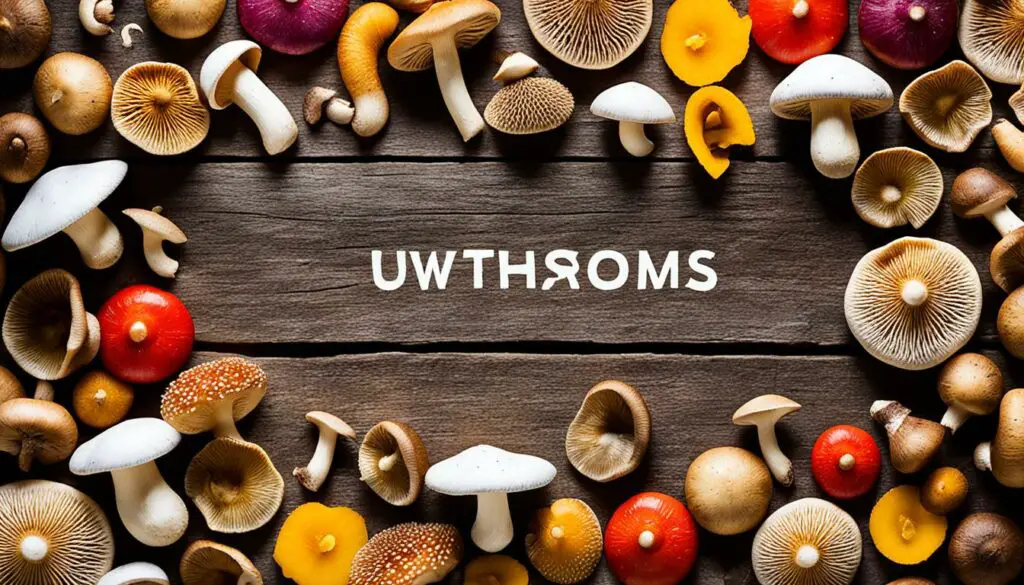
When it comes to enjoying mushrooms, you might be wondering which varieties are safe to eat raw. While some mushrooms are delicious and nutritious when consumed uncooked, it’s important to know which ones are best enjoyed cooked for optimal flavor and nutritional benefits.
Here are the mushrooms that are safe to eat raw:
- White mushrooms
- Cremini mushrooms
- Portobello mushrooms
- Enoki mushrooms
Raw mushrooms have a unique texture and a stronger taste compared to their cooked counterparts. The spongy texture of raw mushrooms can add a delightful crunch to your dishes, while the strong flavor can lend a distinctive earthiness to your creations.
However, it’s important to note that when it comes to digesting raw mushrooms, all mushrooms have cell walls made of chitin, a tough substance that is not easily broken down by the human body. This means that consuming raw mushrooms might make it difficult for your body to fully extract all the available nutrients.
To maximize the nutritional value of mushrooms and make their nutrients readily absorbable, cooking them is recommended.
By cooking mushrooms, you can break down their cell walls, releasing a host of nutritional and medicinal compounds that are more easily absorbed by your body. This not only enhances the flavor but also makes the nutrients more accessible and bioavailable.
So, while it’s possible to enjoy certain mushrooms raw, such as white mushrooms, cremini, portobello, and enoki mushrooms, cooking them can unlock their full potential in terms of taste and nutritional value.
Which Mushrooms Aren’t Safe to Eat Raw?
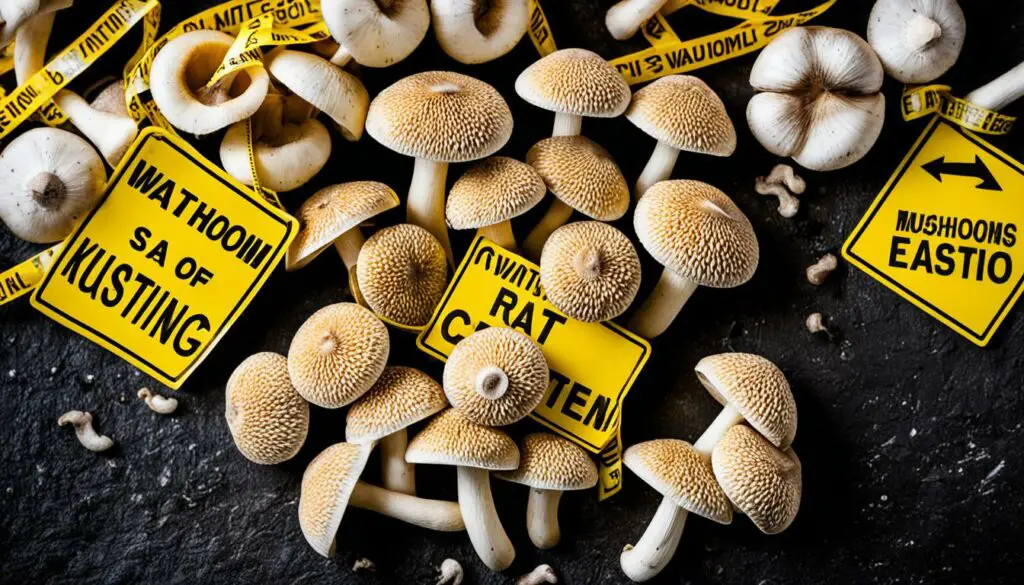
While certain mushrooms are safe to consume raw, it’s important to be aware that not all mushrooms fall into this category. Some mushrooms can be toxic or cause stomach discomfort when eaten raw. It is crucial to exercise caution and avoid consuming the following mushroom varieties in their raw state:
- Reishi mushrooms
- Boletus mushrooms
- Morels mushrooms
- Honey mushrooms
These mushrooms are typically dried, cooked, or prepared in other ways to ensure safety. It’s worth noting that consuming raw wild mushrooms can be particularly risky since certain wild mushroom species can be poisonous. Properly identifying mushrooms before consumption is essential to prevent any potential health risks.
Health Risks of Eating Raw Mushrooms
The health risks associated with eating raw mushrooms primarily stem from the possibility of consuming toxic mushrooms or those that may cause stomach discomfort. Some mushrooms contain natural toxins that are eliminated or reduced through cooking. Eating raw wild mushrooms without proper identification poses a particular danger, as it increases the risk of unintentionally ingesting poisonous varieties. Symptoms of mushroom poisoning can range from mild gastrointestinal issues to potentially life-threatening conditions, depending on the type of mushroom involved.
It’s essential to always exercise caution when consuming mushrooms, especially when they are raw, to prevent any adverse health effects.
Can You Get Sick from Eating Raw Mushrooms?
Yes, consuming raw mushrooms can make you sick if they are toxic or contaminated with harmful bacteria or pathogens. Raw mushrooms, like any other raw food, have the potential to harbor bacteria and other microorganisms that can cause foodborne illnesses. Bacterial contamination can occur during the cultivation, harvesting, handling, or storage process.
Properly cooking mushrooms can help eliminate or reduce the risk of bacterial contamination. It is generally recommended to cook mushrooms to minimize the chance of getting sick.
Additionally, individuals with weakened immune systems, such as pregnant individuals, young children, and older adults, are more susceptible to the health risks associated with consuming raw mushrooms. It is advisable for these individuals to avoid eating raw mushrooms to ensure their well-being.
Can You Eat Raw Mushrooms In Your Salad?
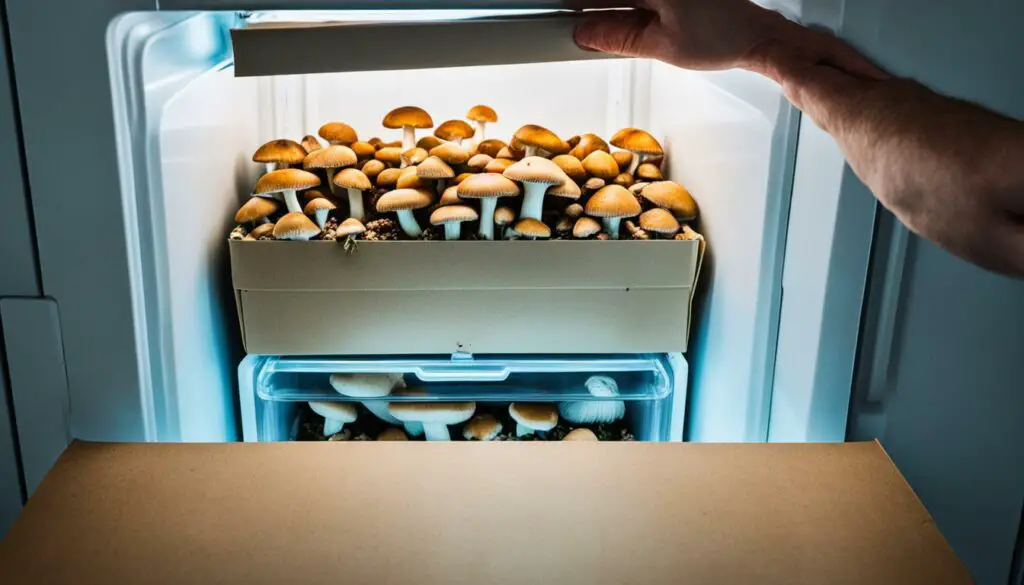
When it comes to enjoying mushrooms in salads, many people wonder if it’s safe to eat them raw. The answer is yes, but with a few caveats. While certain types of mushrooms can be safely consumed raw, it’s important to be aware of potential risks and take the necessary precautions.
One of the considerations when eating raw mushrooms is the presence of agaratine. Button mushrooms, a popular choice for salads, contain this compound that can be harmful in large quantities. However, the levels of agaratine are typically low and unlikely to cause any adverse effects when consumed in moderation.
To ensure the best quality and safety of your mushrooms, it’s crucial to store them properly. Storing mushrooms in the right conditions will help maintain their freshness and prevent bacterial growth. The best way to store mushrooms from the grocery store is to keep them in a cool and dry place.
Here are some tips for storing mushrooms effectively:
- Store mushrooms in a paper bag or cardboard box, allowing them to breathe and release any excess moisture.
- Avoid storing mushrooms in plastic bags or containers, as they can trap moisture and lead to bacterial growth.
- Keep mushrooms in the refrigerator, which helps maintain their freshness. Avoid storing them near foods with strong odors, as mushrooms tend to absorb smells.
Properly storing your mushrooms will help prolong their shelf life and preserve their taste and texture. It’s best to consume them within a week of purchase for optimal freshness.
In conclusion, incorporating raw mushrooms into your salad can be a delicious and nutritious choice. However, it’s essential to be mindful of the type of mushroom and its storage conditions. By following the recommended storage guidelines, you can enjoy the goodness of raw mushrooms while minimizing any potential risks.
| Type of Mushroom | Safety for Raw Consumption |
|---|---|
| White Mushrooms | Safe to eat raw |
| Cremini | Safe to eat raw |
| Portabellas | Safe to eat raw |
| Enoki Mushrooms | Safe to eat raw |
| Button Mushrooms | Contains low levels of agaratine, safe to eat raw in moderation |
Do Mushrooms Have More Nutrition Raw or Cooked?
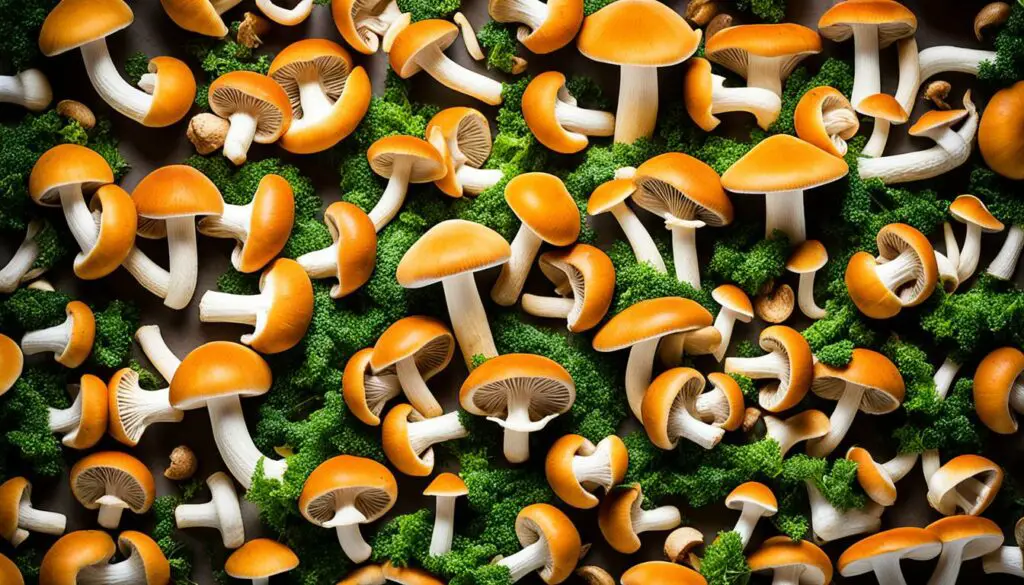
Many people wonder whether mushrooms are more nutritious when consumed raw or cooked. While both raw and cooked mushrooms offer health benefits, cooking them can enhance their nutritional value. Here are some key points to consider:
- Cooking increases polyphenols and antioxidants: The cooking process can significantly increase the levels of polyphenols and antioxidants in mushrooms. These compounds have been linked to various health benefits, including reducing inflammation and protecting against chronic diseases such as cancer and heart disease.
- Boiling mushrooms may lead to nutrient loss: Boiling mushrooms for an extended period of time can cause some nutrient loss, especially water-soluble vitamins like vitamin C and B vitamins. To preserve more nutrients, it is recommended to cook mushrooms using methods that involve minimal water, such as sautéing or baking.
- Breaking down tough cell walls: Raw mushrooms have tough cell walls made of chitin, a substance that is difficult for the human body to digest. Cooking mushrooms helps break down these cell walls, making their nutrients more easily digestible and allowing the body to extract more benefits from them.
“Cooking mushrooms enhances their nutritional value by increasing polyphenols and antioxidants, while boiling may cause nutrient loss. Breaking down tough cell walls through cooking makes mushroom nutrients more easily digestible.”
While raw mushrooms do offer some nutritional benefits, cooking them can make their nutrients more bioavailable and easier for the body to absorb. However, it’s important to note that the specific nutritional content of mushrooms can vary depending on the variety and cooking method used.
The Nutritional Benefits of Mushrooms
Mushrooms are packed with nutrients that can contribute to a healthy diet. Here are some of the key nutritional benefits of mushrooms:
| Nutrient | Amount per 100 grams |
|---|---|
| Protein | 3 grams |
| Fiber | 1 gram |
| Potassium | 318 milligrams |
| Riboflavin (Vitamin B2) | 0.44 milligrams |
| Niacin (Vitamin B3) | 3.6 milligrams |
| Vitamin D | 0 micrograms |
In addition to these nutrients, mushrooms are also a good source of antioxidants, which can help protect the body against oxidative stress and reduce the risk of chronic diseases. Furthermore, mushrooms are low in calories and fat, making them a nutritious addition to any diet.
So, while both raw and cooked mushrooms have their benefits, cooking mushrooms can enhance their nutritional value and make their nutrients more accessible to the body. Whether you choose to enjoy them raw or cooked, mushrooms can be a delicious and nutritious addition to your meals.
Nutritional Benefits of Mushrooms
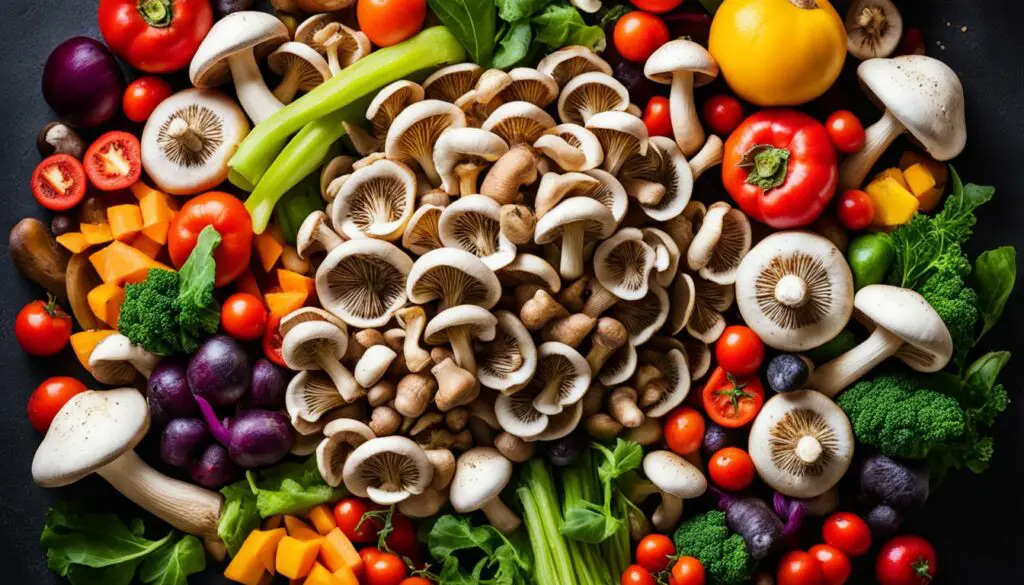
Mushrooms are a delicious addition to many dishes, but did you know that they also offer numerous health benefits? Whether cooked or eaten raw, mushrooms are low in calories and fat, making them an excellent choice for those watching their weight. However, their nutritional value goes beyond being low in calories. Mushrooms are packed with essential nutrients that can support overall health and well-being.
Let’s take a closer look at some of the key nutritional benefits of mushrooms:
- Rich in Essential Nutrients: Mushrooms are a good source of essential minerals such as potassium, which supports heart health, and riboflavin and niacin, which play a crucial role in energy production. Additionally, mushrooms contain vitamin D, a nutrient that is vital for bone health and immune function.
- High Antioxidant Content: Antioxidants are compounds that help protect the body from oxidative stress and damage caused by harmful free radicals. Mushrooms are rich in antioxidants, such as selenium and ergothioneine, which have been linked to various health benefits, including reducing inflammation and preventing chronic diseases.
- Potential Brain Health Benefits: Research suggests that certain compounds found in mushrooms, such as hericenones and erinacines, may have neuroprotective effects and could help enhance cognitive function. Regular consumption of mushrooms may help protect the brain and reduce the risk of age-related cognitive decline and neurodegenerative disorders like dementia.
- A Good Source of Dietary Fiber: Mushrooms contain a decent amount of dietary fiber, which is essential for maintaining a healthy digestive system. Fiber helps promote regular bowel movements, aids in weight management, and supports a healthy gut microbiome. Including mushrooms in your diet can contribute to achieving your daily fiber intake.
To visually demonstrate the nutritional benefits of mushrooms, take a look at the following table:
| Nutrient | Amount per 100g |
|---|---|
| Potassium | 318mg |
| Riboflavin (Vitamin B2) | 0.427mg |
| Niacin (Vitamin B3) | 3.607mg |
| Vitamin D | 0.2mcg |
| Selenium | 22.5mcg |
| Ergothioneine | 4.9mg |
| Fiber | 1.7g |
Table: Nutritional content of mushrooms per 100g.
As you can see, mushrooms have a lot to offer in terms of nutrition. Including them as part of a balanced diet can provide various health benefits, including supporting heart health, brain function, and digestive health. Whether you enjoy them raw in salads or cooked in your favorite recipes, mushrooms are a versatile and nutritious ingredient to incorporate into your meals.
Are Raw Mushrooms Safe to Eat While Pregnant?
Pregnant individuals are advised to avoid consuming raw mushrooms due to the potential risk of bacterial contamination. Raw mushrooms may carry harmful bacteria and other pathogens that can cause food poisoning or digestive issues. This is especially important for individuals with weakened immune systems, such as pregnant women. It is best to consult a doctor for personalized advice on what is safe to consume during pregnancy.
How to Properly Store Mushrooms from the Grocery Store
Mushrooms are a delicate ingredient that require proper storage to maintain their freshness and flavor. Follow these tips to store mushrooms from the grocery store in the best way possible:
- Keep them cool and dry: Store mushrooms in a cool and dry place, such as the refrigerator. Avoid storing them in plastic bags or containers, as they can trap moisture and promote bacterial growth. Instead, use a paper bag or a cardboard box, which allows the mushrooms to breathe.
- Do not wash them before storing: It’s best to avoid washing mushrooms before storing them, as excess moisture can cause them to spoil faster. Wait until you’re ready to use them before rinsing or wiping them clean.
- Store them separately: If you have different types of mushrooms, store them separately to prevent cross-contamination and preserve their individual flavors. You can use separate paper bags or containers for each variety.
- Use them within a week: Mushrooms are best consumed within a week of purchase. As they age, their flavor and texture can deteriorate. If you notice any signs of spoilage, such as a slimy texture or a strong odor, it’s best to discard them.
Tips for Storing Mushrooms:
- Avoid storing mushrooms in plastic bags or containers.
- Keep mushrooms in a cool and dry place, like the refrigerator.
- Store different types of mushrooms separately to preserve their individual flavors.
- Do not wash mushrooms before storing to prevent excess moisture.
- Use mushrooms within a week of purchase for optimal freshness.
Tips for Enjoying Raw Mushrooms
When it comes to consuming raw mushrooms, there are a few tips to keep in mind to ensure a safe and enjoyable experience. Follow these guidelines to make the most out of your raw mushroom dishes:
- Clean thoroughly: Before eating raw mushrooms, it’s important to properly clean them to remove any dirt or substrate. Rinse the mushrooms under cool running water or gently wipe them with a damp cloth.
- Remove tough stems: For larger mushrooms like cremini or portabellas, the stems can be tough and chewy. It’s recommended to remove the stems before consuming raw mushrooms to enhance the texture and taste.
- Try them in salads: Raw mushrooms can add a crunchy texture and earthy flavor to salads. Slice them thinly and toss them with your favorite leafy greens, vegetables, and dressing for a refreshing and nutritious salad.
- Pair with dips: Raw mushrooms can be a delicious addition to dips and spreads. Use them as an edible scoop for hummus, guacamole, or any other dip of your choice.
- Experiment with other raw preparations: Don’t limit yourself to salads and dips. Get creative and explore other raw mushroom recipes such as marinated mushrooms, mushroom ceviche, or stuffed mushroom caps.
However, it’s essential to be aware of potential health risks associated with raw mushrooms. Ensure you properly store and handle mushrooms to minimize the risk of foodborne illnesses.
Remember, consuming raw mushrooms can be a delightful culinary experience, but it’s important to prioritize your health and safety. With these tips in mind, you can savor the unique flavors and textures of raw mushrooms while minimizing any potential risks.
Conclusion
While it is possible to eat raw mushrooms, it is generally recommended to cook them for better flavor and increased nutritional benefits. Certain types of mushrooms, such as white mushrooms, cremini, portabellas, and enoki mushrooms, can be safely consumed raw. However, cooking mushrooms is advantageous as it helps break down their tough cell walls, making their nutrients more easily digestible.
Properly storing and handling mushrooms is also crucial to minimize the risk of foodborne illnesses. It is best to store mushrooms in a cool, dry place, such as a paper bag or cardboard box, to maintain their freshness. Avoid using plastic bags or containers as they can promote moisture buildup and bacterial growth. By following proper storage guidelines, you can enjoy mushrooms safely.
Mushrooms are a nutritious food and provide various health benefits. They are low in calories and fat while being rich in essential nutrients like potassium, riboflavin, niacin, and vitamin D. Additionally, mushrooms are a great source of antioxidants, which can help protect the brain and reduce the risk of dementia. Incorporating mushrooms into your diet, whether raw or cooked, is a great way to boost your nutrition.
In conclusion, while raw mushrooms can be consumed, it is advisable to cook them for enhanced flavor and optimum nutrient absorption. Remember to store mushrooms properly and practice good hygiene when handling them. By following these tips, you can safely enjoy the nutritional benefits that mushrooms have to offer.
FAQ
Can you eat raw mushrooms from the grocery store?
Yes, it is safe to eat certain types of mushrooms raw, such as white mushrooms, cremini, portabellas, and enoki mushrooms.
What are the benefits of eating raw mushrooms?
Raw mushrooms are low in calories and fat, but rich in essential nutrients such as potassium, riboflavin, niacin, and vitamin D. They are also a good source of antioxidants, which have various health benefits. Mushrooms are also a good source of fiber and can contribute to a healthy diet.
Are raw mushrooms safe to eat?
Yes, certain types of mushrooms are safe to eat raw. However, raw mushrooms may have a spongy texture and a stronger taste compared to cooked mushrooms. It is recommended to rinse or wipe mushrooms to remove any dirt or substrate before consuming them raw.
Are there health risks associated with eating raw mushrooms?
Certain mushrooms should be avoided when consuming them raw, as they can be toxic or cause stomach pain. Mushrooms like reishi, boletus, morels, and honey mushrooms should not be eaten raw. It is important to properly identify mushrooms before consuming them. Additionally, pregnant individuals are advised to avoid raw mushrooms due to the potential risk of bacterial contamination.
Can you eat raw mushrooms in your salad?
Yes, raw mushrooms can be enjoyed in salads, with dips, or in other raw preparations. However, it is important to be aware of potential health risks and to properly store and handle mushrooms to minimize the risk of foodborne illnesses.
Do mushrooms have more nutrition raw or cooked?
Cooking mushrooms is recommended to maximize their nutritional value. While raw mushrooms can offer some benefits, cooking them breaks down their tough cell walls and makes their nutrients more easily digestible. Raw mushrooms may be harder for the body to absorb and extract nutrients from.
What are the nutritional benefits of mushrooms?
Mushrooms are low in calories and fat, but rich in essential nutrients such as potassium, riboflavin, niacin, and vitamin D. They are also a good source of antioxidants, which have various health benefits. Research suggests that consuming mushrooms may protect the brain and reduce the risk of dementia. Mushrooms are also a good source of fiber and can contribute to a healthy diet.
Are raw mushrooms safe to eat while pregnant?
Pregnant individuals are advised to avoid consuming raw mushrooms due to the potential risk of bacterial contamination. Raw mushrooms may carry harmful bacteria and other pathogens that can cause food poisoning or digestive issues. This is especially important for individuals with weakened immune systems, such as pregnant women. It is best to consult a doctor for personalized advice on what is safe to consume during pregnancy.
How to properly store mushrooms from the grocery store?
To properly store mushrooms from the grocery store, they should be kept in a cool and dry place. Avoid storing them in plastic bags or containers, as this can cause moisture buildup and promote bacterial growth. It is best to store mushrooms in a paper bag or cardboard box, which allows them to breathe and helps maintain their freshness. Mushrooms can be stored in the refrigerator for up to a week.
Any tips for enjoying raw mushrooms?
When consuming raw mushrooms, it is important to properly clean them by rinsing or wiping off any dirt or substrate. Removing the stems of larger mushrooms like cremini or portabellas is recommended, as they can be tough to chew. Raw mushrooms can be enjoyed in salads, with dips, or in other raw preparations. However, it is important to be aware of potential health risks and to properly store and handle mushrooms to minimize the risk of foodborne illnesses.
Source Links
- https://nublumemushroom.com/blogs/blogs/can-you-eat-raw-mushrooms-the-answer-may-surprise-you
- https://www.naturesrise.com/blogs/brainfood/can-you-eat-raw-mushrooms
- https://www.epicurious.com/expert-advice/how-to-store-mushrooms
See also:

Leave a Reply